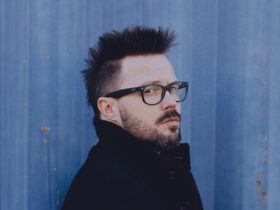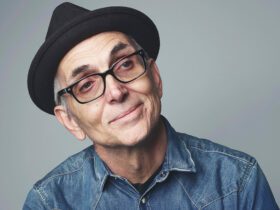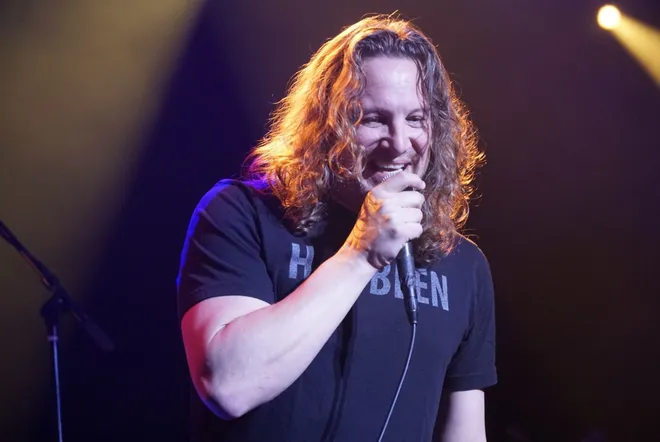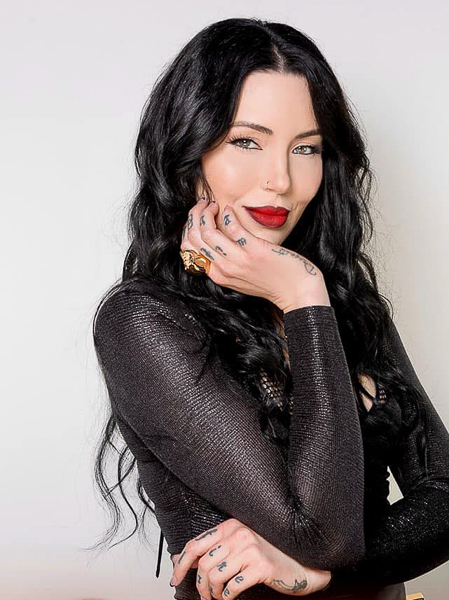I recently had the opportunity to interview Mark Evans by phone from his home in Sydney, Australia. He reminisced about his time in the band and shared his thoughts about brothers Angus and Malcolm Young, the driving force behind AC/DC. He also talked about AC/DC’s former singer, the legendary Bon Scott, who died in February 1980, right before AC/DC achieved international fame with the release of “Back in Black,” an album that sold over 26 million copies, which featured Brian Johnson on vocals.
Mark Evans: Hey Thom how are you doing? It’s great to speak with you!
Thom Jennings: It’s my honor, I really enjoyed the book a lot and it’s an honor to speak with you.
ME: Well right up front I’ve got to tell you that they sent over the review you did and all I can say is that you got the book straight down the line. How you read it and received, it is exactly how I hoped people would get it. It’s a great review and probably my favorite so far, thank you very much.
TJ: Well I can’t thank you enough for this book. It’s not just another one of those crappy stories about guys getting wasted and chasing girls. It’s genuine, and after I finished it I not only respected you as a writer but as a person.
ME: The initial motivation of the book was to put fans of the band inside the band, because nobody has done that before. It’s a payoff for all the kindness and support I have been shown over the years. I have a lot of respect for the guys, even though, as you probably know, we don’t have any contact anymore, which is a shame. You have to respect them for all they’ve done but you have to tell it like it is.
TJ: It still has to feel good that you were a part of AC/DC’s legacy. I think you mentioned in the book that they still play a lot of the songs from the era when you were in the band.
ME: Yeah, people ask me all the time if I am pissed off about how things happened but it’s just not in my makeup to be like that. I’ve got to be honest with you and say that an extra few million would be ok but that’s just the way it panned out. I must say I really cherish my time with those guys. We had some great times. Recently somebody sent me a picture of Malcolm and I playing pool in the green room at Countdown (a famous music television show in Australia) and Angus is in the background. I’m not going to say it was all hearts and roses then, but at that time we were all really close. I have some great memories from those days. I don’t know if any of the guys have read the book, but if they did, I hope it set off some cool memories for them as well.
TJ: I don’t think you did anybody wrong in the book, I hope they read it too. I must say it blows my mind to think about how much happened in two years. I mean you got right into the thick of things right away, living with the band then going off to England.
ME: We also made three records during that time. I think it is indicative of how the business has changed. It’s still a great business with all its ups and downs and technology has changed it a lot. I remember being on the road with the guys and making a three minute call home for a friend’s birthday was a big deal and cost you an arm and a leg. I am envious of the guys today with Skype and being able to watch your favorite football team on the internet. A lot of the problems I had on the road wouldn’t be there today because I could stay connected. I have very strong family ties and when I am away from them, I feel it. To be connected with them the way you can today would make it a real buzz to be on the road.
TJ: If we could, I would like to talk about the Young brothers, all three. I was surprised at how much George Young had to do with the band’s early days. George was a famous musician in Australia, and it gave me the impression that was why Angus and Malcolm had a businesslike approach to the band even early on.
ME: During the time I was in the band George was indispensable. Not just in the studio, but as a mentor and a guide to how to run things. I think George’s influence can’t be overstated. You have to remember that Angus and Malcolm grew up in the west of Sydney with George and The Easybeats having a hit with “Friday on My Mind.” He was a bona fide rock star and that set the bar higher for Angus and Malcolm. Most bands start out just wanting to get gigs, but Angus and Malcolm were writing songs before they formed the band and they immediately started thinking about making records and getting the band overseas. George was a master in the studio and helped the guys along and George was the most astute guy I ever met in the business.
TJ: One of my favorite stories in the book is when you and Bon Scott were hanging out together after you had left AC/DC. Can you share some memories about Bon?
ME: I covered a lot of this in the book, but here in Australia we call our close friends “mates.” Bon only ever introduced me to one of his mates and that was a guy named Pat Pickett who became part of the road crew and a very close friend of mine until he passed about twelve months ago. Bon had a lot of acquaintances but few very close friends, which is strange when you consider the type of guy Bon was. He was really warm, courteous and friendly in his natural form. Once he got a few shots of Jack Daniel’s in him he would take off a bit like everyone does, but he was a warm-hearted caring guy. It’s not unusual for people to have very different public and private personas, obviously there are different facets of people. Onstage you become bigger than life and Bon knew that he had a responsibility to keep that up. What is surprising about Bon is that offstage he was very domesticated, he liked to clean and used to divorce himself from the band when we were off the road so he could do his own thing. Everybody has this idea of the wild eyed rock and roller, which was part of it, and even later that satanic thing the guys got messed up in which is odd to me and runs contrary to what I think of the guys. He was just a warm guy.
TJ: Another time you talk about is when you were ribbing Angus about attending a Beatle’s concert in Australia. You wrote that you found out later he was telling the truth about seeing them but how did you find that out?
ME: I found out later that his big sister Margaret, who made the school suits, used to take Angus and Malcolm to concerts at the Sydney Stadium and that was one of them. She even took them to see Louis Armstrong. The taste in music in the family was amazing and I found out Maragaret would take them to a lot of concerts. As I said in the book, I was wrong! I made an asshole out of myself that night, and Angus punched me in the mouth, but I deserved it. I should have punched myself in the mouth, at least it would have hurt a little more.
TJ: I kind of got the impression that you and Angus just never really hit it off, like you just had a personality conflict.
ME: My relationship could be very good but it was always tenuous. I wasn’t Robinson Crusoe, other guys had the same problems I had but I think it’s a testament to how much the band meant to him and his determination. He is an intense little guy. The weird thing is my best friend, a guy named Graham Kennedy, who has been my best friend since I was about ten years old and still is today, got along with Angus like a house on fire. He used to tell how a great a guy Angus was so here was my best friend getting along with Angus when I would have these clashes with him. But in the purest sense I think there were times when we just used to annoy each other. When you have five guys in a band it’s not going to be roses and chocolates every day of the week.
TJ: Later in the book you talk about Jason Newstead coming into your store and buying a bass. It made me remember a time when he was in Metallica where he said he always felt like the new guy. AC/DC were not superstars when you joined but they had established themselves to a degree. I wonder if that had anything to do with it.
ME: Well I was never made to feel like I was the new guy in the band. While there were no bells and whistles welcoming me on board- I was never even officially asked to join the band- I was able to fall in with them pretty easily. That’s the way it should be with any band. It’s funny, when people want to talk to me about the band, particularly here in Australia, they say they prefer the band with Bon and not with the ‘new’ singer. I say give the guy a break, he has been with the band thirty years! I think it’s kind of funny but it is also indicative of how strong Bon’s presence still is.
TJ: It’s funny when you consider that the first album with Brian Johnson not only makes AC/DC superstars but it also made Bon and even bigger star. Before “Back in Black” was released “Dirty Deeds Done Dirt Cheap” wasn’t even considered good enough to release in the United States.
ME: I am not a great believer in fate, but sometimes things just happen. If “Dirty Deeds” came out in America in 1976, like we planned it, I wonder what happens. It came out when things were changing and the band had a lot of gravity. Things had changed with the loss of Bon, but to release that album when they did, right after “Back in Black,” helped it a lot. And “Back in Black,” what a great record, and when you consider what the guys were going through at the time, I have a lot of respect for that one.
TJ: One final question, I know you wrote about it in the book but can you share the story about the time you met George Harrison?
ME: It’s strange when you meet a guy like George, and I had a similar experience with Ron Wood, because you know them so well and it’s hard not to be overly personal. I knew who George Harrison from The Beatles was from when I was five years old. It’s a surreal experience and I will qualify that by saying I was not a huge Beatles fan, but to meet someone that changed the music business so much is pretty amazing. He could be very prickly, and I saw him turn himself off and turn away from people. He could be very acid and cutting but once he got to know you a bit it was amazing how normal the guy was. If you can be one of the Beatles and be normal. Of course to George Harrison being a Beatle was being normal. I am sure Michael Jackson thought he was normal. The way George conducted himself taught me a lot, he was well mannered and kept his sense of humor. He didn’t have a lot of tolerance and didn’t like to waste time. I wondered if he felt like time was running out. I think losing Lennon weighed heavily on him. I heard he was a spiritual guy and I am sure that helped him get through the whole thing.
We continued to chat for a little while after the interview about the music business and some of our favorite bands. It came up in conversation that Bryan Adams was playing in the area and Mark informed me that if I got to meet Bryan to tell him that Mark was an A & R guy for Bryan’s label in Australia when his debut album came out and he really pushed the album. I doubt I will meet Bryan Adams anytime soon, but I can always say that I interviewed a guy from AC/DC, and that is pretty cool for anyone who loves rock music.
We would like to thank Magnus Henriksson of Bazillion Points Publishing for setting up the interview with Mark. For more information on the book and to purchase a copy, please go to: Bazillion Books.





